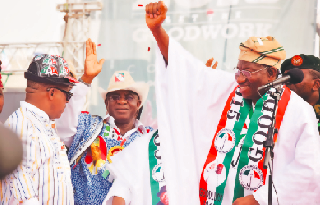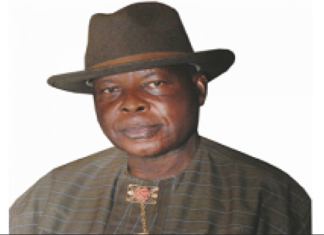Assistant Politics Editor, DANIEL KANU, writes on the upsurge of political activities after the lull that greeted the election postponement.
Political activities in the country took unusual plunge immediately the six-week postponement of the general election was announced by the Chairman of Independent National Electoral Commission (INEC), Prof Attahiru Jega.

Following the shift, the election will now hold on March 28 and April 11.
The reason for the postponement came after the nation’s security chiefs said they could not safeguard the polls, and require at least six weeks to launch military campaign to reclaim seized territories from Boko Haram insurgents, particularly in the troubled North East zone.
On account of the successes in the military campaigns, many expect that the elections will now hold as scheduled. It is obvious that of all the elections, the presidential election slated for March 28, from all indications, will be the most competitive, the most challenging and the most intriguing.
It also has the characteristic of turning out to be the toughest of all the presidential elections conducted in Nigeria since the return of civil rule on May 29, 1999.
Political commentators agree that the contest is very crucial, as it will determine who will direct the affairs of the most populous black African country and Africa’s biggest economy, for the next four years.
Although 14 candidates are going for the race, it is obvious that it is an affair essentially between President Goodluck Jonathan of the Peoples Democratic Party (PDP) and Muhammadu Buhari of All Progressives Congress (APC).
In the beginning
When Jonathan and Buhari kicked off their presidential campaigns in January, the political climate was charged.
For Jonathan, thousands of people gathered at Tafawa Balewa Square in Lagos, on Wednesday, January 7, to attend the official kick-off of his presidential campaign. It was the first in the series of campaigns for his re-election bid. It was an occasion where the president and his party also presented flags to all its 36 gubernatorial candidates.
A day before Jonathan’s campaign kick-off, Buhari had, at the Adokiye Amasiemaka Stadium in Port Harcourt, Rivers State, received his mammoth crowed of supporters.
With the kick-off by the two major players, the political climate was animated until the election was rescheduled. And the lull set in.
The Buhari factor
Perhaps, in line with the mood of the day, Buhari travelled out of the country. On February 26, he was at the Royal Institute of International Affairs, London (Chatham House) and explained why he wants to be president after he left office as military Head of State, more than 30 years ago. He said he is in the race to restore the country’s glory.
Buhari said he’s worried because the work of making Nigeria great is not yet done, just as he said that one of his major priorities as president would be to fight corruption in all its ramifications, adding that no corrupt person would be appointed into his cabinet.
The retired General also promised to lead the way with force of personal example, especially in tackling waste and corruption.
Said Buhari: “But I must emphasise that any war waged on corruption should not be misconstrued as settling old scores or a witch-hunt. I’m running for president to lead Nigeria to prosperity and not adversity.”
According to him, “the institutions of state dedicated to fighting corruption will be given independence and prosecutorial authority without political interference”.
Since his arrival in the country, APC has also embarked on some strategic moves aimed at wooing voters. Buhari has, for instance, paid an unusual visit to Second Republic president, Shehu Shagari, who clocked 90 recently. The Sokoto visit brought back memories of the Shagari civilian administration that was incidentally toppled by Buhari and his colleagues in the army. Aside felicitating with the former president whose anniversary was celebrated while he was away, it is believed that Buhari may have been advised by his party men to embark on the visit to seek forgiveness from him.
In addition, the party has settled with the rally technique. In it, APC chieftains choose to make appearances at different states as it suits them.
Members and supporters of the party, on Saturday, March 7, took to the streets in what they termed a one-million man march.
From Maryland area to the Surulere area of Lagos mainland and stopping at the Teslim Balogun Stadium, party leaders canvassed support at the polls.
As the marchers made a final stop at the Teslim Balogun Stadium, the leaders seized the opportunity to address the crowd on the forthcoming elections.
The march, no doubt, was largely a political statement, especially in a strategic state like Lagos where, not only number matters, but the commerce makes the decision of voters and leaders significant.
The party has also said there will be more rallies for Buhari before the election, with Abuja coming next.
Despite what chieftains of the party described as the success of the march, Ekiti State Governor, Ayodele Fayose, dismissed it as a plot by the party to cause chaos and pandemonium in the state, so as to take the minds of the public away from the lies they told about the health status of Buhari.
Fayose said in a statement by his Special Assistant on Public Communications and New Media, Lere Olayinka, that “walking the streets of Lagos by the APC won’t remove the fact that the party is a congregation of liars and deceitful people, who can never be trusted with the resources of Nigeria and its people.”
Fayose, who insisted that Buhari was not healthy enough to govern Nigeria, said: “A man who campaigned for four weeks, speaking for less than one hour in all the rallies put together and needed to rest for 15 days should just stay at home and be playing with his grandchildren rather than struggling to take up a job that he does not have the required mental and physical strength to do.”
Jonathan changes gear
Jonathan, who had been in the country all the while, cashed in on the absence of his APC counterpart to penetrate areas that could hitherto be described as enemy territory.
In his renewed “offensive”, he also changed tactics. In the new agenda, the president has tactfully shifted from the colourful campaign that was energy-sapping, to meeting with opinion-moulders from all the zones of the country.
He also put up a demonstration of his fitness for the job in recently walking 4.1 kilometres from Aso Rock to Eagles Square accompanied by prominent sports personalities, politicians and other supporters. He termed his walk “a physical training exercise”.
The exercise, obviously part of the president’s re-election campaign, was attended by sports stars such as Nwankwo Kanu, Austin Eguavoen, Mary Onyali and Peter Rufai. Vice President Mohammed Sambo and President of the Senate, David Mark, among other top government officials and presidential aides, also joined in the long walk.
Analysts are agreed that with the new strategy, Jonathan and his campaign handlers, no doubt, have redoubled their efforts to ensure PDP gains very significant votes from the South West.
The decision, TheNiche gathered, was based on calculations that the zone, because of its high number of registered voters, was critical to the president’s re-election.
In the exercise, Jonathan has visited major socio-political groups in the South West, as well as the Alaafin of Oyo, Oba Lamidi Adeyemi III; and the Ooni of Ife, Oba Okunade Sijuwade. Others are the Olubadan of Ibadan, the Ataoja of Osogbo, among other first class Yoruba traditional rulers.
The move, it was learnt, has earned the president deep penetration into the South West.
Apparently basking on the perceived success of the new strategy, Ondo State Governor and chairman of the party’s Local Organising Committee (South West), Olusegun Mimiko, said Jonathan remains a better candidate, urging Nigerians to settle for a presidential candidate who is “cool as a cucumber”, rather than one who is not “21st century educated”.
He stressed further: “In spite of the antics of the opposition, that President Jonathan is the most abused, most insulted, most negatively-profiled president in the history of our nation, he has refused to roll out any obnoxious law of the semblance of Decree 2 of 1984.”
Another effort by the president to sell himself to the voters is brandishing all his achievements, which his supporters believe are under-reported. The move, incidentally, is working for him, according to his admirers.
“There is no sector that Jonathan has not improved upon. Forget the APC negative media propaganda. Jonathan has done so much for Nigeria. He is a silent worker. My happiness is that at the end of the day, Jonathan will win the election to shame the APC. Nigerians now know better,” submitted Andrew Balogun, a legal practitioner.
Last line Since the return of Buhari from London, political actions have peaked again, but with different strategies by the two leading parties.
It is strongly believed that if Nigerians can, for once, get it right by voting wisely and using their votes to elect a detribalised, focused, dynamic, intelligent, visionary and honest personality as president on March 28, a firm foundation would have been laid to move the nation forward.
As the clock ticks, the generality of Nigerians seem to be waiting patiently to cast their votes for their preferred candidates.













